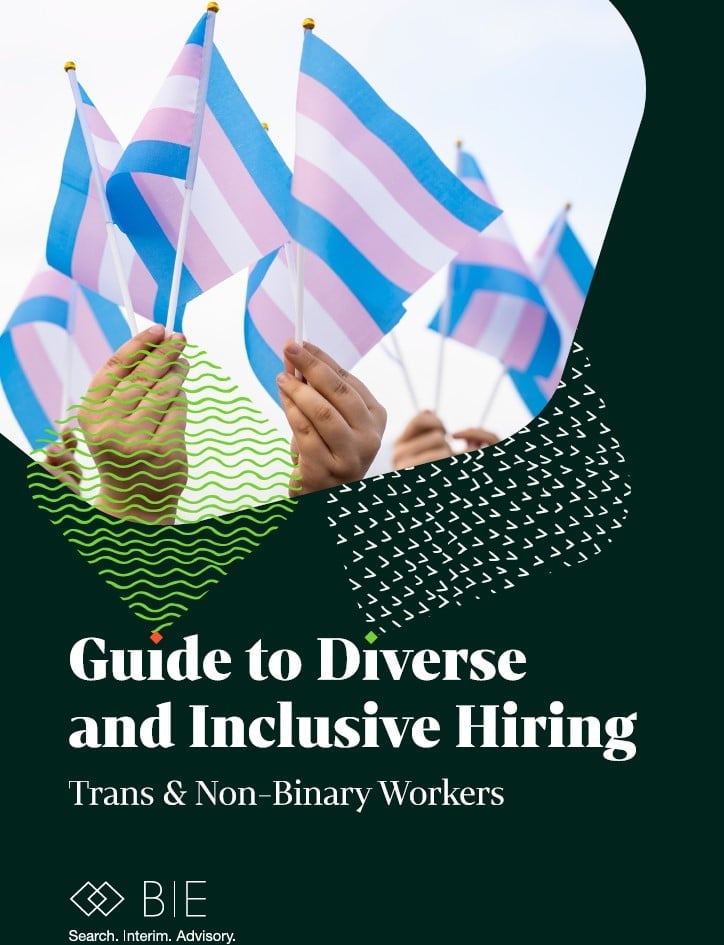
It is important to build a culture that encourages and supports all individuals – candidates and employees alike – so that you can attract talent to work for your organisation and employees feel able to bring their true and authentic selves to the office.
The work to create diverse and inclusive hiring processes to welcome trans and non-binary employees starts long before the first advertisement is posted for a position.
To begin, you need to understand where you are on your inclusion journey. Take a look at your email signatures – do they include pronouns? Do you have an internal LGBT+ or Ally network, or belong to any externally? Are trans/non-binary calendar days recognised?
Explore how you can make processes fairer across the board. Everyone should have an equal opportunity to progress and thrive in your company. It may benefit you to debias and demystify pay and promotion criteria, for example.
Internal surveys to capture D&I data can be an effective tool for equality, and can be implemented during recruitment, employment and even exit interviews. They allow you to gauge how your employees feel about work, highlighting belonging and community more generally, and evaluate which inclusion strategies work and where work is needed to improve. In addition to giving you a greater understanding of and insights into your workforce, it also sends the message that you take your D&I commitment seriously.
Capturing data about sexual orientation and gender identity must be done responsibly, and employees should be given the option to answer anonymously or confidentially. They are not being asked to “out” themselves. The Stonewall “Do Ask, Do Tell” guide is a vital resource, offering best practice tips and guidance on everything from cultural considerations and communicating with staff, to case studies, project planning and more.
As business leaders, you need to be beacons for D&I – and accountable for its progress. This principally means three things: putting company leaders at the centre of your D&I efforts; signalling leadership’s openness and commitment to welcoming trans and non-binary employees; and ultimately championing diverse talent for leadership and management roles.
Inclusion is best achieved when everyone within the business knows and, crucially, understands your inclusion intentions and strategy. Taking the time to explain and train your workforce now will benefit you greatly in the long term.
In terms of the big picture, this can involve inviting external groups, like Stonewall, Diverse Matters, The Diversity Trust and others to host trainings and events to suit your needs for your existing staff. You can also implement new staff inductions on equality, diversity and inclusion to ensure that new team members are brought on board with your principles immediately.
Meanwhile, embrace the day-to-day communication opportunities afforded by your more casual internal channels as well – everything from bulletin boards to team meetings – to share your message of inclusion.
In addition to bringing your general workforce up to speed, pay particular attention to frontline functions that are directly responsible for making sure that trans and non-binary employees are supported and respected, such as line managers and HR. Make sure they know what to look out for with regards to transphobia and discrimination, encourage them to learn more and search out relevant training for them.
Don’t forget your wider support staff, such as receptionists, security and telephone support. Offering them guidance and training on respectful communication will benefit them and give them confidence, and in turn make candidates, employees and clients more comfortable.
Policies are your values made manifest. They are a vital part of building trust and confidence in your organisation. They act as a protective shield for trans and non-binary people who might otherwise feel vulnerable in your workplace.
When drafting policies, it is important to draw on a wide range of resources and advisory bodies in order to ensure a breadth and depth of perspective. Stonewall has provided an exceptional collection of best practice, toolkits and resources that can be tailored to your needs. External bodies such as trade unions (Unison, STUC and the TUC) and government or public health groups (LGBT Health, Government Equalities Office and Scottish Trans Alliance) can also be invaluable.
Begin with creating a document that covers how you support expression of gender and transitioning in the workplace, and build from there. You should also implement a zero-tolerance policy towards bullying, harassment and other discriminatory behaviour. Send the message that you stand by your trans and non-binary employees and any disrespectful attitudes or actions will not be tolerated.
Candidates from the trans and non-binary communities will look for signs of whether yours is a safe, tolerant and inclusive workplace before considering whether to apply.
Conduct a thorough review of your recruitment processes to make sure that everything from adverts to your application forms are inclusive.
A person’s gender should never be assumed. Many trans and non-binary candidates understandably may not want to discuss their gender status during an interview, and candidates should never be asked.
Your recruitment managers need to be fully up to date with your company policies, best practices and the law (the Gender Recognition Act 2004 and Equality Act 2010, for example – for more information, UNISON offers a good overview of trans and non-binary workers’ rights) in order to conduct inclusive interviews. Refresher courses and training should be offered where necessary.
If a candidate wishes to disclose their gender identity, or their intention to transition, it is important for the recruiting manager to react appropriately immediately. Taking a moment to recover themselves, for example, does not send the right message. The manager should thank the candidate for their openness and share details of the support that your company may be able to provide, as well as reaffirming the values that the team holds. If the candidate feels comfortable, you can get on with the purpose of the interview: finding out whether the candidate has the skills and experience for the role.
Data privacy is of vital importance for trans and non-binary individuals. The documentation they are asked to provide for job applications, such as a passport or birth certificate, may not use their current name. Your HR function should be trained to deal with such documentation sensitively and correctly.
Before a trans or non-binary individual starts work, you should ask them whether their status is to be openly known. It is their status and their choice. Their privacy is of the utmost importance.
To download a PDF version of this guide please click here.
If you would like any assistance with making your hiring processes fully inclusive, from resources to hands-on guidance, please contact our E,D&I lead Eoin Canty and he will be happy to advise you.
A selection of resources and policy examples:
